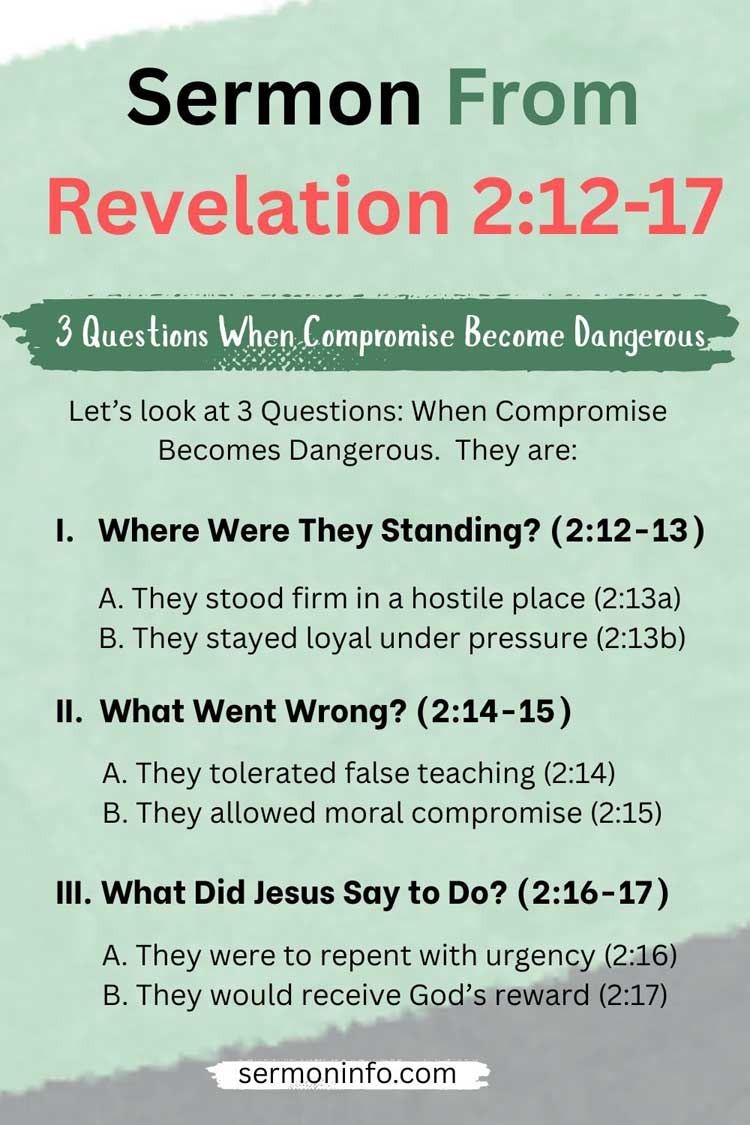Sermon From Revelation 2:12-17 (Pergamos) reminds us: what we tolerate today may control us tomorrow.

Sermon From Revelation 2:12-17 (Pergamos)
In Revelation 2, Jesus speaks directly to the church in Pergamum, a city flooded with idols, pressure, and spiritual compromise. They were faithful in persecution, yet slowly gave ground to false teaching and moral decline. The danger wasn’t outside—it was what they began to tolerate within.
Compromise rarely feels dangerous at first. It slips in quietly—just one small concession, one ignored conviction, one tolerated sin. But over time, it weakens our witness and dulls our devotion.
I remember a friend who once stood strong for Christ but slowly let culture shape his values. He didn’t fall overnight—it was a slow drift into compromise. That’s why today we’re asking: Where are we standing? What are we allowing? What is Jesus saying to us now? These are the “3 Questions When Compromise Becomes Dangerous.”
1. Where Were They Standing?
“And to the angel of the church in Pergamos write, ‘These things says He who has the sharp two-edged sword: I know your works, and where you dwell, where Satan’s throne is. And you hold fast to My name, and did not deny My faith even in the days in which Antipas was My faithful martyr, who was killed among you, where Satan dwells.'” (Revelation 2:12–13)
A. They stood firm in a hostile place (2:13a)
Pergamum wasn’t just another city—it was a spiritual stronghold. Jesus calls it the place “where Satan has his throne.” That’s strong language. This city was drenched in idol worship, emperor cults, and pagan rituals. Everywhere you turned, there were temples, shrines, and pressure to bow. But the believers didn’t pack up and leave—they stayed.
They didn’t chase comfort, and they didn’t compromise to blend in the culture. They held the line in enemy territory. That kind of faith speaks volumes today. God isn’t looking for believers who need perfect surroundings to stay strong. He’s looking for people who stay faithful when the culture turns dark. Like Daniel in Babylon, they lived in the middle of it—but didn’t let it live in them.
B. They stayed loyal under pressure (2:13b)
Jesus says, “You did not renounce your faith in me, not even in the days of Antipas, my faithful witness.” Antipas wasn’t just a name in a letter. He was one of them—a real brother in Christ who paid the ultimate price. Tradition tells us he was killed publicly for refusing to worship Caesar.
That kind of pressure isn’t just ancient history. Some of you know what it feels like to be the only Christian in your family. Others face ridicule at work for your convictions. But faith that stands in fire is faith that shines. First Peter 1:7 says tested faith is more precious than gold. Pergamum’s church wasn’t perfect—but in a time of fear, they held fast to Jesus.
“This material provides some ideas and thoughts for a message from Revelation 2:12-17 on the topic: When Compromise Becomes Dangerous.”
2. What Went Wrong?
“But I have a few things against you, because you have there those who hold the doctrine of Balaam, who taught Balak to put a stumbling block before the children of Israel, to eat things sacrificed to idols, and to commit sexual immorality. Thus you also have those who hold the doctrine of the Nicolaitans, which thing I hate.” (Revelation 2:14–15)
A. They tolerated false teaching (2:14)
Jesus says, “You have people there who hold to the teaching of Balaam.” That reference takes us back to Numbers 22–25. Balaam couldn’t curse Israel directly, so he led them into compromise—mixing with idol worship and sexual sin. It wasn’t a direct attack. It was subtle, deceptive, and deadly.
That’s the danger of false teaching. It doesn’t always deny the truth—it twists it just enough to feel right. The church didn’t fully embrace error, but they allowed it. Maybe out of fear. Maybe out of niceness. But truth matters. Paul warned in Galatians 5:9, “A little yeast works through the whole batch of dough.” Even a small shift in doctrine can eventually wreck a church.
B. They tolerated sinful behavior (2:15)
Not only were they soft on teaching—they were soft on living. Jesus says, “You also have those who hold to the teaching of the Nicolaitans.” This group likely promoted the idea that grace gives us permission to live however we want. That’s not grace—it’s rebellion dressed up in church clothes.
They tolerated sin in the name of peace, but that kind of peace is a lie. Holiness isn’t optional—it’s the evidence of real faith. Jesus didn’t die so we could stay in sin. He died to set us free from it. Romans 6:1–2 asks, “Shall we go on sinning so that grace may increase? By no means!” God’s people must live like they belong to Him.
3. What Did Jesus Say to Do?
“Repent, or else I will come to you quickly and will fight against them with the sword of My mouth. He who has an ear, let him hear what the Spirit says to the churches. To him who overcomes I will give some of the hidden manna to eat. And I will give him a white stone, and on the stone a new name written which no one knows except him who receives it.” (Revelation 2:16–17)
A. They were to repent with urgency (2:16)
Jesus doesn’t leave them in confusion. He says clearly, “Repent therefore!” That word means to turn around—to change course before it’s too late. He gives no room for delay. The next words are sobering: “Otherwise, I will soon come to you and fight against them with the sword of my mouth.”
This isn’t about losing salvation. It’s about losing spiritual influence, power, and protection. Compromise weakens the church. Jesus takes it seriously—and so should we. He confronts us not to shame us, but to save us. Hebrews 12:6 reminds us, “The Lord disciplines the one He loves.” Repentance may be hard, but it always leads to healing.
B. They would receive God’s reward (2:17)
To the faithful, Jesus gives two promises. First, hidden manna—spiritual nourishment the world can’t offer. He will sustain your soul when nothing else can. Second, a white stone with a new name—a symbol of acceptance, victory, and identity in Christ. That’s personal. That’s intimate.
The world offers compromise; Jesus offers treasure. Don’t trade what’s eternal for what’s easy. Your loyalty matters to God. Your perseverance will be rewarded. Revelation 2:17 ends with this invitation: “Whoever has ears, let them hear what the Spirit says to the churches.” That’s us. Let’s listen. Let’s respond, and let’s walk in truth—together.
Conclusion
Believers, compromise is never harmless. It starts small—just one quiet concession—but it slowly steals our convictions, our courage, and our clarity.
Pergamum reminds us that Jesus sees both our faith and our faults. He commends loyalty but also confronts what we allow to remain unchecked.
We can’t afford to flirt with false teaching or make peace with sin. Truth matters. Holiness matters. Our witness depends on it.
But here’s the good news—Jesus offers more. To those who turn back, He promises spiritual strength and eternal reward. He gives manna for the weary and a new name for the faithful.
So let’s not drift into compromise. Let’s decide. Let’s be the kind of people that doesn’t just look strong—but stays strong in a world that constantly pulls us to compromise.
Today, if the Spirit is speaking—listen, respond, and trust God to help you stand firm. Faithfulness is never easy, but it is always worth it.
Source Material
7 Churches of Revelation Explained Written Article Summarizing the 7 Churches of Revelation
Believer’s Bible Commentary by William MacDonald
The MacArthur Bible Commentary by John MacArthur
You Can Understand the Book of Revelation by Skip Heitzig
40 Days Through Revelation by Ron Rhodes
Revelation by Charles C. Ryrie
